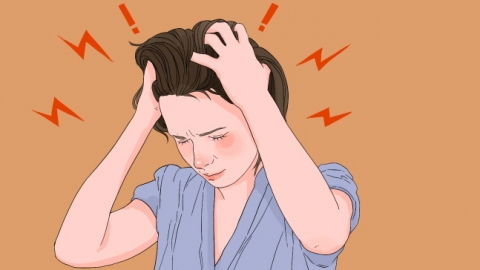Why do I become irritable one week before my period?
"Yima" usually refers to menstruation. Irritability one week before the onset of menstruation may be caused by hormonal fluctuations, excessive mental stress, premenstrual syndrome (PMS), hyperthyroidism, anxiety disorder, etc. This can be improved through emotional regulation, adjustment of daily routines, and medication. If irritability progressively worsens or is accompanied by other discomforts, prompt medical attention is necessary.
1. Hormonal fluctuations: Before menstruation, rapid changes in estrogen and progesterone affect neurotransmitter secretion, leading to emotional sensitivity and irritability. It is recommended to maintain a regular sleep schedule, avoid staying up late, engage in moderate exercise to relieve stress, and communicate frequently with others to ease emotions.
2. Excessive mental stress: The combination of work- and life-related stress along with anticipation of menstrual discomfort can trigger mood swings, manifesting as irritability and anxiety. It is advised to simplify daily tasks to reduce burden, relax the mind and body through listening to music or meditation, and maintain a calm state of mind.

3. Premenstrual syndrome (PMS): Hormonal changes before menstruation cause a series of symptoms. In addition to irritability, these may include breast tenderness, headaches, and fatigue. It is recommended to take medications such as fluoxetine dispersible tablets, sertraline tablets, or spironolactone under medical guidance to alleviate symptoms.
4. Hyperthyroidism: Excessive secretion of thyroid hormones accelerates metabolism, causing emotional excitement and irritability, along with palpitations, excessive sweating, and weight loss. Under medical supervision, medications such as methimazole tablets, propylthiouracil tablets, or propranolol tablets may be used to manage symptoms.
5. Anxiety disorder: Long-term psychological stress or abnormal neural regulation may lead to anxiety disorder, which can be exacerbated by hormonal changes during menstruation, presenting as irritability, excessive worry, and insomnia. Follow medical advice to use medications such as paroxetine tablets, fluvoxamine tablets, or diazepam tablets to improve symptoms.
Maintaining regular meals with balanced nutrition, eating more fresh fruits and vegetables to supplement vitamins, avoiding spicy and stimulating foods, ensuring adequate sleep, and engaging in mild physical activities appropriately can help stabilize mood and reduce discomfort.




